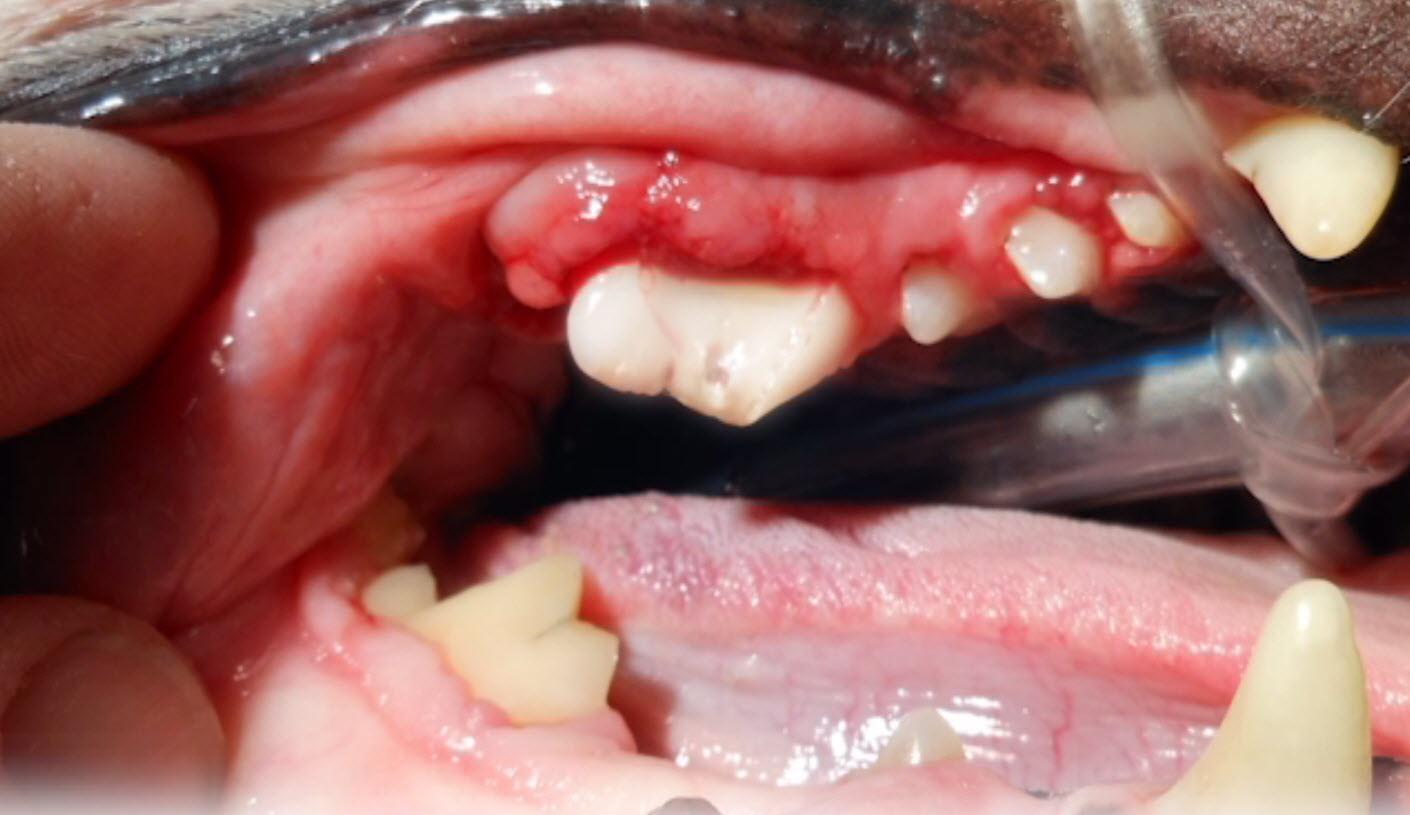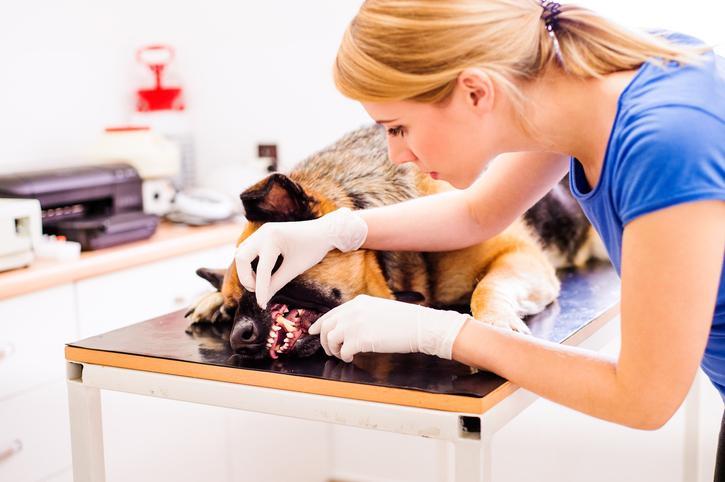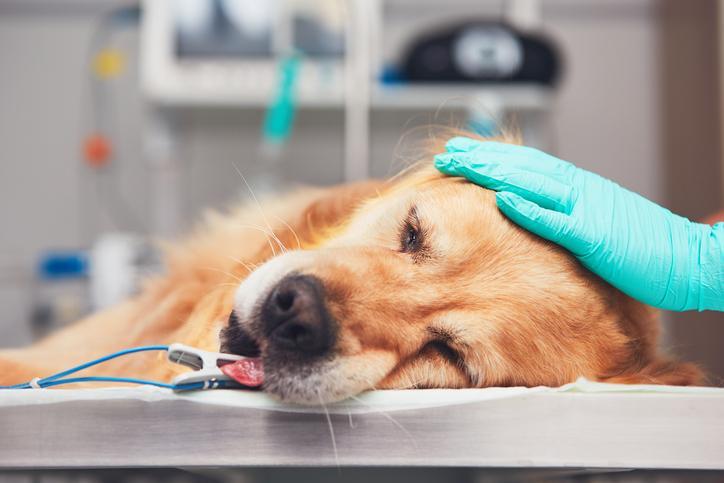Stomatitis in Dogs - Causes, Symptoms and Treatment

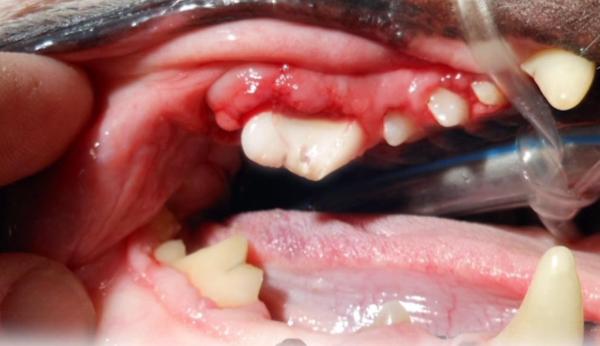

See files for Dogs
Oral health problems in our dogs can be extremely detrimental to their health. Dogs use their mouths to eat. Pain and discomfort of the mouth area can make eating difficult and even prevent them from ingesting the nutrition they need to survive. They also use their mouths to communicate and even interact with their environment, so these problems can essentially prevent them from being a dog. Inflammation of the oral mucosa is known as stomatitis, a problem with multiple potential causes and various repercussions for the dog's wellbeing.
At AnimalWised, we look at the causes, symptoms and treatment of stomatitis in dogs. If we recognize any of the symptoms in our dog, we need to take them to a veterinarian to diagnose the issue and administer the correct corresponding treatment.
What is stomatitis in dogs?
In terms of anatomy, a ‘stoma’ refers to any opening of the body. Natural stomata include the mouth, but also the anus and the nose. However, stomatitis is a problem which is specifically related to the dog's mouth and lips. More precisely, it refers to inflammation of the oral mucosa.
Inflammation of the gums is known as gingivitis, as gingiva are the mucus membranes around the teeth. When a dog has inflammation of the gums and other parts of the oral mucosa at the same time, it is known as gingivostomatitis in dogs[1]. We can be alerted to this problem if we see redness and swelling or if the dog's gums are bleeding.
While stomatitis refers to general inflammation of the mouth, there are variances of this condition. For example, it is common for the dog to develop ulcers, leading to ulcerative stomatitis in dogs. If this condition persists or the dog has regular relapses, it is known as canine chronic ulcerative stomatitis (CCUS). This i
While stomatitis results in inflammation of the mouth area, this does not necessarily mean the cause is directly related to this part of their anatomy. The causes can be localized or generalized. In this way, the condition of the dog's mouth can be revealing about their general state of health and wellbeing. This is often the case with CCUS, especially if the dog has immune-mediated issues such as hemolytic anemia in dogs.
Below, we look into detail about some of the common causes of stomatitis in dogs.
Causes of stomatitis in dogs
As we have said, stomatitis is inflammation of the oral mucosa . It is a problem which also normally affects the gums (gingivitis) and the tongue (glossitis). This can be a serious problem which causes a lot of pain and affects their general wellbeing.
Some of the common causes of stomatitis in dogs include:
- Periodontal disease: can cause chronic paradental ulcerative stomatitis in dogs. This is a problem which affects the support structures of a dog's teeth and can even result in the dog's teeth becoming rotten and falling out.
- Foreign bodies: this can occur when the dog ingests something sharp which sticks into the oral mucosa. These can be almost anything, but may commonly occur with splinters of bone, sticks or even seed casings from plants.
- Lacerations or burns: these can be caused by the aforementioned foreign bodies, but the inhalation or ingestion of irritating substances can also result in the dog's mouth swelling.
- Toxic substances or drugs: various substances are toxic to dogs, even if they otherwise cause no problems for us or other animals. A dog may also experience a reaction as an unintended side effect to a particular medication.
- Systemic diseases: as explained above, stomatitis can be a result of generalized problems which affect various bodily systems. These problems can include diabetes, hypothyroidism, leptospirosis and canine distemper, as well as autoimmune diseases such as pemphigus or lupus. Kidney disease can cause something known as uremic stomatitis in dogs.
- Infections: infections can be caused by various pathogenic agents, including fungi. This is responsible for fungal stomatitis in dogs and is the result of fungi such as Candida albicans. Viral and bacterial infections can also result in stomatitis. Such infections are more common when the dog is older or immunosuppressed. Lesions can develop and infections are particularly associated with ulcerative stomatitis.
- Deficiency diseases: such as avitaminosis. Lack of proper nutrients could be behind stomatitis, but these are very rare diseases in domestic animals. They may be more likely to exhibit in dogs which have experienced neglect as poor diet can cause mouth swelling.
- Genetic diseases: certain genetic factors may cause the dog to be immunosuppressed, something which can result in more frequent cases of stomatitis.
- Neoplasms: although rare, oral cancers and other types of mouth tumor can cause stomatitis.
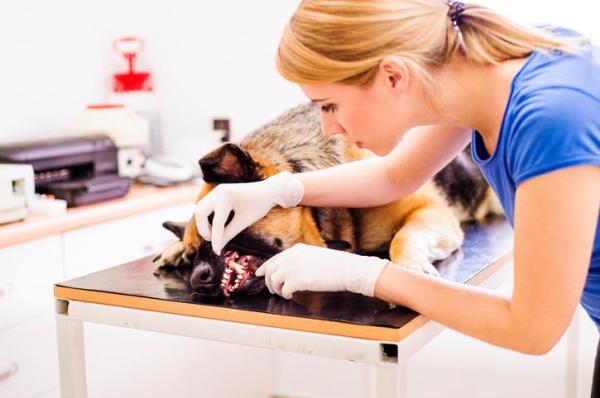
Symptoms of stomatitis in dogs
It is important to note that stomatitis is not a disease, but a symptom of various other diseases and conditions. When the dog develops this problem, the pain and swelling experienced in the mouth can influence the clinical signs. Common symptoms of stomatitis in dogs include:
- Hypersalivation
- Bad breath
- Inability to eat due to pain
- Difficulties when swallowing
- Dehydration
- Resistance to mouth being manipulated
- Inflammation and redness in the oral cavity
- Ulcers
- Bleeding gums
- Head rubbing to relieve pain
Since stomatitis is a symptom of an underlying condition, we may also observe other symptoms related to their specific cause.
Diagnosis of stomatitis in dogs
Our veterinarian will ask us about the dog's history, in case the stomatitis is caused by contact with an irritant substance or a drug. If unknown, a canine blood test can be performed to discover any systemic diseases.
When diagnosing stomatitis, it may be necessary to sedate the dog. This is both because the dog might experience significant pain during the examination and because it might be practically difficult for the veterinarian. Smears, cultures or biopsies of the interior of the oral cavity can be done if necessary. X-rays may also be required, depending on the symptoms. Establishing a correct diagnosis is imperative for correct treatment.
Specific types of stomatitis in dogs
We have already mentioned some of them in the sections above, but there are different types of stomatitis in dogs. There are also different types of stomatitis in humans, but not all of these will affect dogs. For example, humans can develop stomatitis nicotina from smoking, but this will not affect dogs.
Some types of stomatitis in dogs we have not mentioned are the following:
- Necrotizing ulcerative stomatitis in dogs: we mention it because of the extreme pain it causes. It is caused by bacteria and produces strong mouth odor in the dog, purulent saliva and bleeding gums. It is a severe case in which ulcers can be observed. It can be caused by periodontal disease.
- Lymphoplasmacytic gingivostomatitis in dogs (LPGS): appear to be immunologically based. Although it is relatively rare in dogs, it may be genetically influenced and more common in certain breeds. Treatment is complex and the prognosis reserved[2].

How to treat stomatitis in dogs
The treatment of stomatitis in dogs will depend on the underlying cause. For example, a foreign body will need to be removed or an infection needs to be treated with antibiotics. Since the hygiene of the dog's mouth is very important, it is likely an oral cleaning will take place at some stage. This will need to be done under anesthetic to remove tartar and address any affected teeth.
Medicated antibacterial mouthwash may be prescribed, especially if the dog is suffering from periodontal disease. This cannot be administered in the same way as human medicine. We will need to soak some gauze with the mouthwash and gently rub it on the dog's gums, teeth and other parts of the oral cavity. A syringe may also be used in some cases.
Since stomatitis affects the mouth, we will also need to adjust the dog's diet until the inflammation has reduced. In some cases, this will require a soft diet for the dog as they will not have to crunch on anything hard. In cases which are sufficiently advanced, the dog may need a feeding tube to ensure their nutritional needs are met.
In some cases, the dog may have a systemic condition which is persistent. This is especially the case in immune-mediated conditions. In these cases, the problem may not be curable, but symptom management and immunity boosting may be required.
This article is purely informative. AnimalWised does not have the authority to prescribe any veterinary treatment or create a diagnosis. We invite you to take your pet to the veterinarian if they are suffering from any condition or pain.
If you want to read similar articles to Stomatitis in Dogs - Causes, Symptoms and Treatment, we recommend you visit our Other health problems category.
1. Lyon K. F. (2005). Gingivostomatitis. The Veterinary clinics of North America. Small animal practice, 35(4), 891–vii.
https://doi.org/10.1016/j.cvsm.2005.02.001
2. Moreira, M., Roura, Lloret Roca, A., Planellas, M. (2008). Lymphoplasmacytic gingivostomatitis in dogs: 6 clinical cases. AVEPA, 28(4), 277.
https://ddd.uab.cat/record/79916





